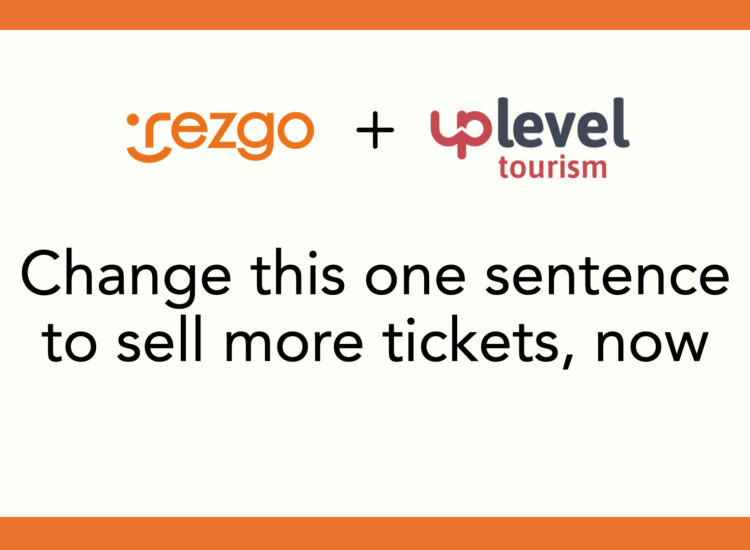If you’ve been following along with us here at UpLevel for a while, you know web messaging, in particular, is something we love developing and work closely to help our clients hone.
During the webinar, I highlighted a crucial yet often-overlooked element of tourism marketing: The first sentence on a tourism website.
Over the past decade and with dozens of successful clients, we’ve seen how this one sentence sets the tone for visitor engagement and, ultimately, conversion. That’s why we advocate for a shift towards conversion copywriting—a strategy designed to prompt immediate visitor action and, in turn, boost bookings.
Seriously. Who couldn’t use more bookings?
Conversion copywriting is all about clarity and immediacy – eliminating heavy thinking for visitors by making what you offer instantly obvious. Potential guests shouldn’t have to work hard to understand what makes you valuable; the value proposition should be evident from the start.
The 3 Primary Types of Copywriting
Effective copywriting can be broken down into three categories:
- Narrative Copywriting: This type of copywriting is all about telling a story. It’s used to take the reader through a journey, often seen in blogs, news articles, and tour websites. The goal is to engage the audience by communicating a compelling narrative that keeps them interested and connected to the content….assuming they have the time and patience to read it.
- Brand Copywriting: Brand copywriting aims to be memorable. It focuses on creating content that reflects a brand’s unique perspective, helping to build brand recognition and loyalty. The objective is to make the audience remember the brand, ensuring it stands out in their minds.
- Conversion Copywriting: Conversion copywriting is designed to persuade the audience to take a specific action. This type of copy is crafted with the intention of getting the reader to do something, whether it’s making a purchase, signing up for a newsletter, or clicking a link. It’s all about driving actions that convert readers into customers or leads.
While each has its place, for tourism websites aiming for visitors to buy tickets, conversion copywriting is key.
This approach directly addresses visitors’ needs and guides them toward booking with clear, straightforward language.
While talking with the team at Rezgo, I provided practical advice on constructing sentences that capture attention and convert visitors into customers. The importance of simplicity and directness cannot be overstated; ambiguous language leaves potential customers guessing. I recommend using clear, direct language that answers essential questions upfront:
- What do we offer?
- Why is it meaningful?
- How can the visitor quickly engage with it?
Don’t Forget the Audience
Before we move on, a quick word about your audiences: writing to the right audience is crucial. Writing intended to resonate with everyone will resonate with no one. Imagine if Adele, or Taylor Swift, or James Taylor didn’t write to a specific, brokenhearted, nostalgic audience?
Understanding your One Target Guest™ and crafting messages that resonate with their desires and needs is essential.
I won’t go into a tone of detail here, but during my conversation with Rezgo I shared techniques for identifying your target guest, and focusing marketing efforts on the characteristics of the most profitable guest segment.
Advice for The Real World
Good ideas shouldn’t just work in theory. They should work for real, and the best ideas work as a whole.
Beyond the initial and crucial sentence, other website elements influence engagement and conversion, such as call-to-action buttons and navigation. Aligning these elements with the overall copywriting strategy is clutch to creating a cohesive, user-friendly experience.
Thoughtful, well-structured copywriting goes beyond mere words on a page. It involves understanding psychology, marketing strategy, and user experience design—all integral to creating a successful tourism website that converts browsers into buyers.
It may sound like magic, but most of the time, it’s simply good planning and execution.
A Longer Listen for a Shorter Sentence
If you’re up for giving it a listen, I believe the whole conversation we had at Rezgo offers a fresh perspective on how even a single sentence can influence the success of a tourism website.
Simplifying complex marketing challenges into actionable steps is key to leaving a lasting impression and equipping businesses with the tools needed to enhance their online presence and boost sales.
Operators left the webinar with new strategies to revisit and revamp their website content, focusing on conversion and customer engagement.
Every word is important in attracting and retaining customer interest, proving that even small changes can lead to significant improvements in business outcomes. Good luck out there!


